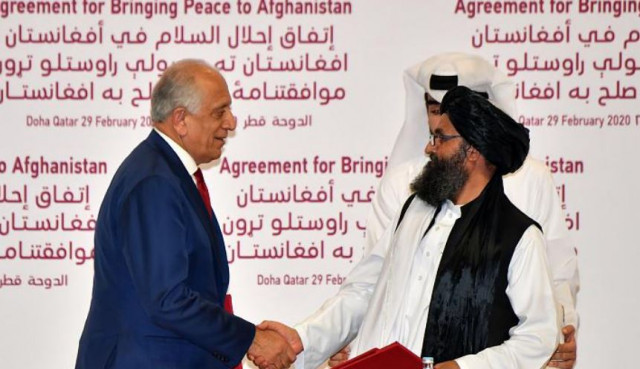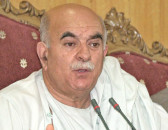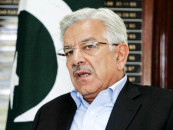Pakistan cautions against Afghan peace deal review
FO says process advances into an important phase that needs ‘commitment and responsibility’ by all sides

Pakistan on Thursday said the Afghan peace process had advanced into an important phase that needed “commitment and responsibility” by all sides, in a calculated statement that suggests Islamabad is not favouring the review of the peace deal by the new US administration.
Top officials of the Biden administration recently indicated that the US would review the landmark deal signed between Washington and Afghan Taliban in February last year. The development came at a time when intra-Afghan dialogue is under way in Doha where the Afghan Taliban and Afghan government have been trying to finalise the agenda.
The talks have so far made slow progress due to differences between the two sides. What added to the already complicated process is the continued violence in Afghanistan.
The administration of Afghan President Ashraf Ghani was quick to welcome the announcement of a review by the Biden administration, while accusing the Taliban for not living up to the agreement.
Asked to comment on the Pakistan’s reaction to the possible review, Foreign Office spokesperson Zahid Hafiz Chaudhri told reporters that Pakistan had consistently maintained that there was no military solution to the Afghan conflict.
“An Afghan-led and Afghan-owned peace process for an inclusive, broad-based and comprehensive political settlement is the best way forward for achieving lasting peace and stability in Afghanistan,” he added.
“Towards this end, Pakistan has been constructively engaged with all Afghan sides as well as the international stakeholders for facilitating the Afghan peace process. The international community has duly recognised Pakistan’s efforts in this regard,” the spokesperson said.
The spokesperson said that Pakistan appreciated the progress made in the peace process during the last one year, particularly the developments, including signing of the US-Taliban agreement, start of the intra-Afghan negotiations and agreement on the rules and procedures.
“We believe that the intra-Afghan negotiations have now advanced into an important phase where all the negotiating sides are required to show continued commitment and responsibility for moving forward towards reaching a comprehensive political settlement,” Chaudhri said.
“It is important for Afghan to seize this historic opportunity.”
The carefully-worded remarks suggested that Pakistan wants the Biden administration to stick to the ongoing peace efforts. Officials here believe that any major review may further complicate the process, which is already struggling to reach the final solution.
The spokesperson said that Pakistan continued to reiterate its calls on all sides for taking measures for reduction in violence leading to a ceasefire, which was linked to progress in the intra-Afghan negotiations. “Pakistan reiterates its abiding commitment to a peaceful, stable, sovereign, united and democratic Afghanistan.”
Regarding the US-Pakistan ties under the new US administration, the spokesperson said that Pakistan attached great importance to its partnership with the United States. “This is a key bilateral relationship that has been a factor for regional peace and stability,” the spokesperson said.
“We have achieved a lot by working together in the past. The logic for continued engagement and coordination is even more compelling in the context of shared geopolitical and security challenges,” the spokesperson added.
He said that Pakistan and the US had worked closely towards “our shared objective of peace” in Afghanistan. “President Biden is well familiar with our region. He visited Pakistan in 2009 and 2011,” he said.
“We look forward to working with the new administration to further strengthen our bilateral ties to make it multifaceted, sustainable and mutually beneficial and continue our partnership to achieve peace, stability and prosperity in the region.”
Regarding the recent protests by farmers in New Delhi, the spokesperson strongly denied claims by certain Indian ministers that Pakistan and China were behind the ongoing agitation by farmers.
“It may be recalled that Indian Union Minister Raosaheb Danve had alleged that China and Pakistan were behind the ongoing protests by farmers. Such baseless and irresponsible statement from Indian Minister reflects the true mindset of the BJP government, who finds it convenient to blame India’s neighbours for all its internal failings. Such mindset is not only dangerous for Indian minorities but also imperils regional peace and security,” the spokesperson said.
“We have been repeatedly saying that India is not a democracy but an extremist Hindutva regime. The BJP governments’ actions against minorities have revealed the true face of India to the world. Today, the so-called largest democracy in the world stands fully exposed. Minorities in India are finding themselves increasingly insecure,” he said.
He said the treatment of minorities in India is a matter of serious concern not only for the Indian minorities and the neighbouring countries but also for the international community.



















COMMENTS
Comments are moderated and generally will be posted if they are on-topic and not abusive.
For more information, please see our Comments FAQ